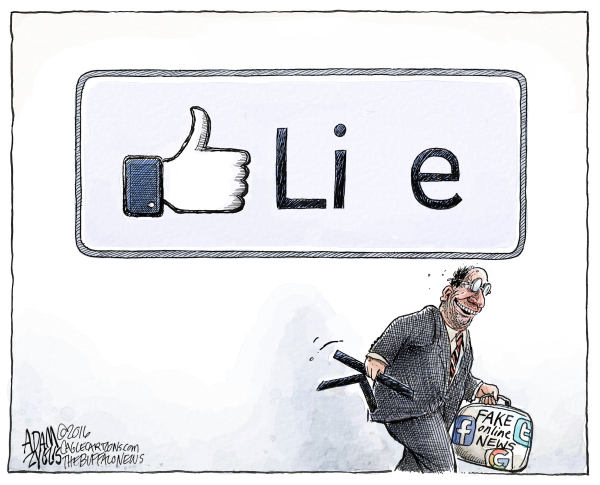
In the free marketplace of ideas, true ideas are supposed to compete with false ones until the truth wins -- at least according to a leading rationale for free speech. But what if the rise of fake news shows that, under current conditions, truth may not defeat falsehood in the market? That would start to make free speech look a whole lot less appealing.
The rise of fake news therefore poses a serious challenge to our basic ideas about the First Amendment. Much of the debate in recent weeks has focused on social media and search engines. But whether the market for ideas is failing is more fundamental than whether Facebook or Google can be blamed for algorithms that promote and spread false stories.
Start with the famous metaphor introduced by Justice Oliver Wendell Holmes almost 100 years ago, in a dissent in the 1919 case Abrams v. United States. Holmes argued that "the best test of truth is the power of the thought to get itself accepted in the competition of the market."
Holmes's notion of the marketplace of ideas offered an economics-inflected version of John Stuart Mill's argument that truth thrives from the "collision with error." Both were modern echoes of John Milton's much earlier faith that when Truth and Falsehood were allowed to "grapple" on the field of battle, Truth would win in "a free and open encounter."
But to take the marketplace metaphor seriously means admitting that sometimes, markets fail. Holmes himself gave us the most famous example of market failure when he said, in a different 1919 case, Schenck v. United States, that even "the most stringent protection of free speech would not protect a man in falsely shouting fire in a theatre and causing a panic."
This thought experiment in turn led Holmes to his most famous formulation of free speech doctrine: that the question in every case is whether the words "create a clear and present danger."
Falsely shouting fire in a theater is a perfect example of market failure in the communication of ideas. The person shouting knows he is lying -- but others don't know, and won't have time to check. The words will cause an immediate panic, even if everybody is acting rationally, because the only logical thing to do is to get out, and get out quickly.
As the Nobel Prize winning economist George Akerlof showed in his classic 1970 article, "The Market for Lemons," asymmetric information can systematically distort the quality of what's available in the market. In his stylized example, if good cars and lemons are both for sale, and consumers know this but don't know which are which, they will be willing to pay the average price. That will lead the sellers to withhold the good cars, which could fetch a higher price -- but that in turn will lead consumers to lower the price they are willing to pay. The resulting spiral of adverse selection leads to market failure.
As it happens, it's a lot more expensive to generate true news stories than false ones. News requires reporting and research and institutional structures like editors and fact checkers to support them. Fake news only takes one person's imagination. And there is certainly information asymmetry between the person who writes a story and the person who reads it. Applying the Akerlof analysis suggests that fake news could conceivably drive out true news.
The classic solution to market failure is regulation. Holmes, in his fire-theater example, certainly believed that was permitted by the First Amendment.
The question is whether government regulation of fake news would be justified and lawful to fix this market failure. Obviously, it would be better if the market would fix the problem on its own, which is why attention is now focused on Facebook and Google. But if they can't reliably do it -- and that seems possible, since algorithms aren't (yet) fact-checkers -- there might be a need for the state to step in.
Under current First Amendment doctrine, that wouldn't be allowed. The Supreme Court has been expanding protections for knowingly false speech, not contracting it. And it would be extremely difficult to separate opinion from fact on a systematic basis.
But we shouldn't assume that the marketplace of ideas works perfectly. And given that, we shouldn't be slavishly committed to treating the marketplace metaphor as the basic rationale for free speech.
Maybe we should be thinking more about the competing argument offered by Holmes's contemporary, Justice Louis Brandeis. Brandeis asserted "that public discussion is a political duty, and that this should be a fundamental principle of the American government." For him, it was "the function of speech to free men from the bondage of irrational fears." False news that hinders public discussion and encourages irrationality may have a role in the marketplace; but it doesn't contribute to the good functioning of democracy.
Comment by clicking here.
Noah Feldman, a Bloomberg View columnist, is a professor of constitutional and international law at Harvard University and the author of six books, most recently "Cool War: The Future of Global Competition."


 Contact The Editor
Contact The Editor
 Articles By This Author
Articles By This Author